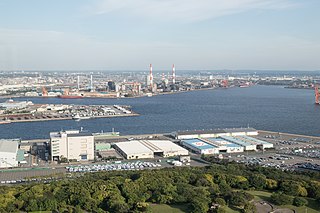
Pharmaceutical Research and Manufacturers of America, formerly known as the Pharmaceutical Manufacturers Association, is a trade group representing companies in the pharmaceutical industry in the United States. Founded in 1958, PhRMA lobbies on behalf of pharmaceutical companies. PhRMA is headquartered in Washington, D.C.
The International Intellectual Property Alliance (IIPA) is a coalition of seven trade associations representing American companies that produce copyright-protected material, including computer software, films, television programs, music, books, and journals. Formed in 1984, it seeks to strengthen international copyright protection and enforcement by working with the U.S. government, foreign governments, and private-sector representatives.
The International Council for Harmonisation of Technical Requirements for Pharmaceuticals for Human Use (ICH) is an initiative that brings together regulatory authorities and pharmaceutical industry to discuss scientific and technical aspects of pharmaceutical product development and registration. The mission of the ICH is to promote public health by achieving greater harmonisation through the development of technical guidelines and requirements for pharmaceutical product registration.
The software industry includes businesses for development, maintenance and publication of software that are using different business models, mainly either "license/maintenance based" (on-premises) or "Cloud based". The industry also includes software services, such as training, documentation, consulting and data recovery. The software and computer services industry spends more than 11% of its net sales for Research & Development which is in comparison with other industries the second highest share after pharmaceuticals & biotechnology.

Japan's major export industries include automobiles, consumer electronics, computers, semiconductors, copper, and iron and steel. Additional key industries in Japan's economy are petrochemicals, pharmaceuticals, bioindustry, shipbuilding, aerospace, textiles, and processed foods.
The pharmaceutical industry is one of the leading industries in the People's Republic of China, covering synthetic chemicals and drugs, prepared Chinese medicines, medical devices, apparatus and instruments, hygiene materials, packing materials, and pharmaceutical machinery. China has the second-largest pharmaceutical market in the world as of 2017 which is worth US$110 billion. China accounts for 20% of the world's population but only a small fraction of the global drug market. China's changing health-care environment is designed to extend basic health insurance to a larger portion of the population and give individuals greater access to products and services. Following the period of change, the pharmaceutical industry is expected to continue its expansion.
The International Federation of Pharmaceutical Manufacturers & Associations (IFPMA) is a trade association that represents internationally over 90 pharmaceutical companies and associations around the world. IFPMA is based in Geneva and is in official relations with the United Nations where it contributes industry expertise to global health discussions.

The Pharmaceutical Inspection Convention and Pharmaceutical Inspection Co-operation Scheme (PIC/S) are two international instruments between countries and pharmaceutical inspection authorities. The PIC/S is meant as an instrument to improve co-operation in the field of Good Manufacturing Practices between regulatory authorities and the pharmaceutical industry.

The European Federation of Pharmaceutical Industries and Associations (EFPIA) is a Brussels-based trade association and lobbying organisation, founded in 1978 and representing the pharmaceutical industry operating in Europe. Through its membership of 36 national associations and 39 leading pharmaceutical companies, the EFPIA represents 1,900 European companies.
Good automated manufacturing practice (GAMP) is both a technical subcommittee of the International Society for Pharmaceutical Engineering (ISPE) and a set of guidelines for manufacturers and users of automated systems in the pharmaceutical industry. More specifically, the ISPE's guide The Good Automated Manufacturing Practice (GAMP) Guide for Validation of Automated Systems in Pharmaceutical Manufacture describes a set of principles and procedures that help ensure that pharmaceutical products have the required quality. One of the core principles of GAMP is that quality cannot be tested into a batch of product but must be built into each stage of the manufacturing process. As a result, GAMP covers all aspects of production; from the raw materials, facility and equipment to the training and hygiene of staff. Standard operating procedures (SOPs) are essential for processes that can affect the quality of the finished product.
Regal Lager, Inc. is a distributor of baby and children's products to both the United States and Canada, and is located in Kennesaw, Georgia. Regal Lager, Inc. works with companies outside the United States, and is known in the baby industry as a push-distributor as they not only provide distribution for their products, but marketing and advertising as well. They are best known for establishing the Baby Björn baby carrier brand in the United States throughout the 1990s. The company won The Swedish Trade Council's annual achievement award for Superb Consumer Market Adaptability in North America in 2001. Today Regal Lager, Inc. is currently responsible for the distribution of the Love To Dream, Dekor, Lascal, Qdos and Nomi brands.
The Juvenile Products Manufacturers Association, Inc. (JPMA) is a national trade organization that represents the juvenile industry defined as from prenatal to preschool. JPMA represents companies in the United States, Canada, and Mexico who manufacture, import and/or distribute infant products.

Headquartered in Boston, Massachusetts, Evenflo Company, Inc. operates the juvenile travel and home safety businesses with products that include car seats, travel systems, safety gates, high chairs, play yards, stationary activity centers, infant carriers and doorway jumpers. Evenflo Company Inc. has two manufacturing facilities: one in Piqua, Ohio, and one in Tijuana, Mexico.
The European Brain Council (EBC) is a coordinating international health organization founded in 2002. It comprises major organisations in the field of brain research and brain disorders in Europe, and thus its structure involves a network of patients, scientists and doctors, working in partnership with the pharmaceutical and medical devices industries. The EBC works with decision making bodies such as the European Commission, the European Parliament and the World Health Organization.

Taiho Pharmaceutical Co., Ltd. is a Japanese pharmaceutical company, and a subsidiary of Otsuka Holdings, which focuses on developing cancer treatments. Taiho, headquartered in Tokyo, Japan, is an R&D-driven specialty pharma focusing on the three fields of oncology, allergies and immunology, and urology.
The Association for Accessible Medicines (AAM), Washington, D.C., is a trade association representing the manufacturers and distributors of generic prescription drugs, manufacturers and distributors of bulk pharmaceutical chemicals, and suppliers of other goods and services to the U.S. generic drug industry. As the primary lobby for makers of generic drugs, AAM's stated mission is to advocate for public policies that facilitate timely access to lower-cost, FDA-approved generic and biosimilar medicines by consumers and patients. Over the 10-year period 2008 through 2018, the use of generic drugs generated $2 trillion in U.S. healthcare savings.
The British Generic Manufacturers Association is a trade association for the British generic drug industry. It has offices in the City of London.
The Portuguese Pharmaceutical Industry Association is a trade association based in Lisbon. It was established in 1975, succeeding the National Guild of the Manufacturers of Medicinal Products which was established in 1939.
BIOTECanada, previously the Industrial Biotechnology Association of Canada, is a Canadian biotechnology industry association based in Ottawa, Ontario. It is an industry-funded membership organization composed of over 250 national and international pharmaceutical and gene therapy companies, medical device manufacturers, agricultural science businesses, law firms, academic institutions, research and development networks, advertising agencies, insurance companies and financial services firms.





